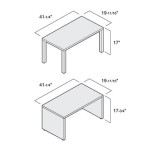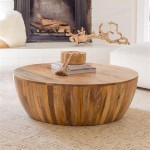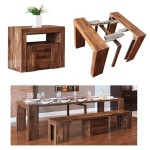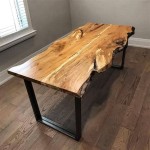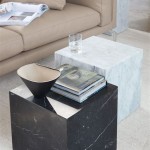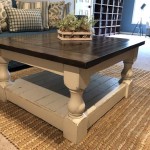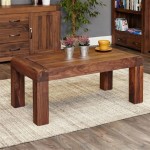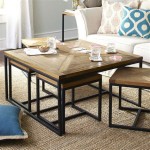All You Need To Know About Commercial Coffee Tables In France
Commercial coffee tables in France, like their counterparts globally, serve a crucial function in various businesses—from cafés and restaurants to hotels, offices, and retail establishments. They are more than just functional surfaces; they contribute significantly to the ambiance, brand identity, and overall customer experience of the space. Understanding the nuances of selecting and sourcing commercial coffee tables in France requires consideration of several factors, including design trends, material preferences, legal regulations, and practical considerations of cost and durability. This article aims to provide a comprehensive overview of these aspects, equipping business owners and interior designers with the knowledge needed to make informed decisions.
The commercial furniture market in France is dynamic and competitive, reflecting the country's rich design heritage and its position as a trendsetter in both fashion and interior design. Key players include both domestic manufacturers and international brands, offering a wide spectrum of styles, price points, and material options. The selection process often involves careful consideration of how the coffee tables will integrate with the existing décor and contribute to the desired atmosphere. Furthermore, businesses must adhere to specific safety and environmental standards, adding another layer of complexity to the procurement process.
Design Trends and Stylistic Considerations
French design, in general, balances elegance with practicality, and this is reflected in the commercial coffee table market. While trends evolve, certain enduring styles remain popular and are adapted to suit contemporary needs. The following provides insights into common design trends observed in France:
Classic Parisian Style: This style often incorporates elements like ornate details, dark wood finishes (such as mahogany or walnut), and subtle embellishments. Coffee tables in this style may feature cabriole legs or intricate carvings. While traditionally associated with formal settings, modern interpretations incorporate cleaner lines and lighter color palettes to create a more contemporary feel. They are frequently seen in high-end hotels and brasseries aiming for a sophisticated and timeless appeal.
Industrial Chic: The industrial aesthetic has gained significant traction in recent years, particularly in urban settings. Commercial coffee tables in this style typically feature raw materials like metal (often powder-coated in black or grey) and reclaimed wood. Designs often incorporate visible hardware and a minimalist approach, emphasizing functionality and durability. This style resonates well with newer cafes and coworking spaces seeking a modern, edgy vibe.
Scandinavian Minimalism: Characterized by clean lines, light wood finishes (such as beech or oak), and a focus on functionality, Scandinavian design principles are increasingly popular in France. Coffee tables in this style are often simple and understated, emphasizing natural materials and a sense of calm. They are well-suited for spaces aiming for a minimalist and inviting atmosphere, commonly found in modern offices and wellness centers. The emphasis on sustainability also aligns with growing environmental awareness.
Modern Contemporary: This broad category encompasses a wide range of designs, from sleek and minimalist to more sculptural and artistic forms. Materials can include glass, metal, stone, and composite materials. Contemporary coffee tables often feature innovative shapes and unexpected details, reflecting a desire for individuality and a departure from traditional norms. This style is frequently chosen for design-conscious establishments seeking to create a unique and memorable experience.
Outdoor-Specific Designs: For establishments with outdoor seating areas, weather-resistant materials are paramount. Common options include aluminum, stainless steel, teak, and synthetic wicker. Outdoor coffee tables are often designed to be stackable or foldable for easy storage and require UV-resistant finishes to prevent fading and deterioration. Design considerations also include stability in windy conditions and drainage to prevent water accumulation.
Beyond general styles, the height and shape of the coffee table are also essential design considerations. Lower coffee tables are typically used in lounge areas, while higher tables are more suited for serving drinks or light meals. Round tables promote conversation and can soften angular spaces, while rectangular tables are more practical for larger groups or for placing items like magazines and books. The overall dimensions of the table should be proportionate to the surrounding furniture and the size of the space.
Material Selection and Durability
The choice of materials for commercial coffee tables in France is a critical factor determining their durability, aesthetics, and suitability for specific environments. Understanding the properties and characteristics of different materials is essential for making informed decisions.
Solid Wood: Wood offers a classic and timeless appeal, providing warmth and character to a space. Hardwoods like oak, walnut, and beech are popular choices due to their durability and resistance to wear and tear. Softwoods like pine are less expensive but require more care and are generally less suitable for high-traffic commercial environments. Wood coffee tables require regular maintenance, including cleaning and polishing, to prevent scratches and stains. The finish on the wood is also crucial, with options ranging from varnishes to oils and waxes, each offering different levels of protection and aesthetic appeal.
Metal: Metal is a durable and versatile material, commonly used in industrial and modern designs. Steel, particularly stainless steel, is resistant to corrosion and is easy to clean, making it a popular choice for outdoor use. Aluminum is lightweight and rust-resistant, making it suitable for both indoor and outdoor applications. Metal coffee tables can be powder-coated in a variety of colors to match the décor of the space. Care must be taken to prevent scratches and dents, particularly on polished surfaces.
Glass: Glass coffee tables offer a sleek and modern aesthetic, creating a sense of openness and lightness. Tempered glass is the preferred option for commercial use due to its increased strength and safety. Glass surfaces are easy to clean but can be prone to scratches and fingerprints. The thickness of the glass is also a crucial consideration, with thicker glass providing greater stability and resistance to breakage. Glass is often combined with other materials, such as metal or wood, to create visually appealing and functional designs.
Stone: Natural stone materials like marble and granite offer a luxurious and durable option for commercial coffee tables. Each piece of stone is unique, adding character and individuality to the space. Stone surfaces are resistant to scratches and heat but can be porous and susceptible to staining. Regular sealing is required to protect the stone from spills and moisture. Stone coffee tables are typically heavier than those made from other materials, requiring careful consideration of the floor's load-bearing capacity.
Composite Materials: Composite materials, such as laminate and engineered wood, offer a cost-effective and durable alternative to solid wood and natural stone. Laminates are resistant to scratches, stains, and moisture, making them suitable for high-traffic areas. Engineered wood, such as plywood and MDF, provides a stable and uniform surface for applying veneers or laminates. Composite materials can be manufactured in a wide range of colors and patterns, offering design flexibility. Proper edging is essential to prevent water damage and maintain the integrity of the material.
The choice of materials should also consider fire safety regulations. In France, commercial establishments are required to adhere to specific fire safety standards, which may restrict the use of certain materials or require the application of fire-retardant treatments.
Legal Regulations and Safety Standards in France
The French government and the European Union enforce regulations related to the safety and environmental impact of commercial furniture. These regulations aim to protect consumers and promote sustainable practices. Businesses operating in France must comply with these regulations when selecting and using commercial coffee tables.
Safety Standards: Commercial furniture must meet specific safety standards to prevent accidents and injuries. These standards address issues such as stability, structural integrity, and the absence of sharp edges or hazardous materials. The relevant standards are typically based on European Norms (EN), such as EN 16139 for strength, durability, and safety requirements for non-domestic seating. Furniture should be tested and certified by accredited testing laboratories to ensure compliance with these standards. The "NF Ameublement" mark is a French quality label that indicates compliance with safety and performance requirements specific to furniture.
Fire Safety: As mentioned earlier, fire safety is a critical consideration in commercial establishments. Furniture must meet specific fire resistance requirements to slow the spread of fire and provide occupants with sufficient time to evacuate. The fire resistance rating of furniture is typically determined by standardized testing methods, such as those outlined in the European standard EN 1021. Businesses should request fire resistance certificates from suppliers to ensure that the coffee tables meet the required standards.
Environmental Regulations: France is committed to promoting sustainable practices and reducing the environmental impact of products. The "loi AGEC" (Anti-Gaspillage pour une Economie Circulaire) law aims to reduce waste and promote a circular economy. This law includes measures related to the durability, reparability, and recyclability of products, including furniture. Businesses are encouraged to choose furniture made from sustainable materials, such as recycled wood or reclaimed metal. They should also consider the end-of-life management of furniture, opting for products that can be easily recycled or refurbished. The "Éco-mobilier" organization is responsible for collecting and recycling used furniture in France, and businesses are required to contribute to this scheme through an environmental tax.
REACH Regulation: The REACH (Registration, Evaluation, Authorisation and Restriction of Chemicals) regulation is a European Union regulation that aims to protect human health and the environment from the risks posed by chemicals. This regulation restricts the use of certain hazardous substances in products, including furniture. Businesses should ensure that the coffee tables they purchase do not contain restricted substances, such as formaldehyde or lead. Suppliers are required to provide information on the chemical composition of their products and demonstrate compliance with the REACH regulation.
Compliance with these legal regulations and safety standards is essential for businesses operating in France. Failure to comply can result in fines, legal liabilities, and reputational damage. Businesses should work with reputable suppliers who are knowledgeable about these regulations and can provide assurance of compliance.

French Bistro Table Sda Ad641012 80 Bizchair

French Bistro Table Sda Ad641012 80 Bizchair

French Bistro Table Sda Ad641012 80 Bizchair

French Bistro Table Sda Ad641011 80 Ctc Event Furniture

French Bistro Set Sda Ad641012 80 2002a Ctc Event Furniture

French Bistro Set Sda Ad641012 80 4001 F Bizchair

French Bistro Set Sda Ad641012 80 4001 F Bizchair

Café Interior Design Ideas To Enhance Your Coffee

1990s Vintage French Parisian Designer Nicolas Blandin Brutalist Coffee Table Chairish

French Bistro Set Sda Ad641012 80 2001 F Best Chiavari Chairs
Related Posts

